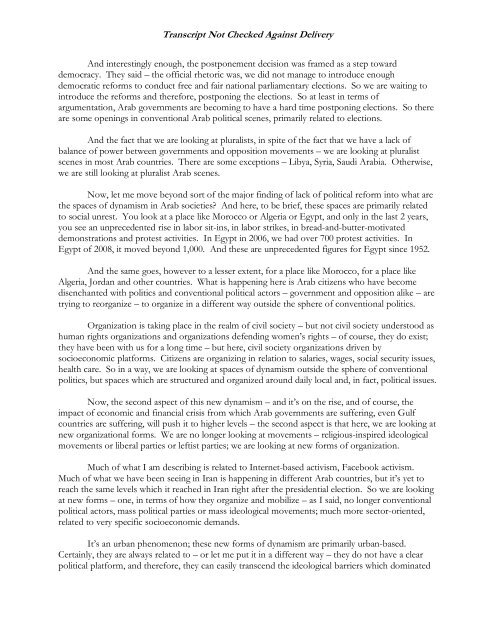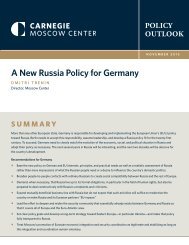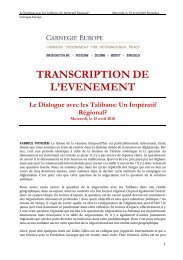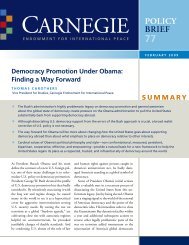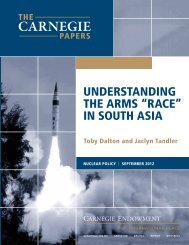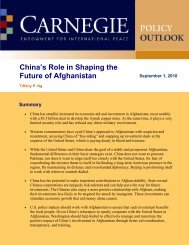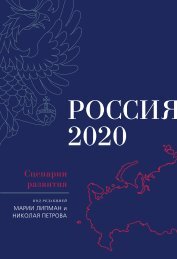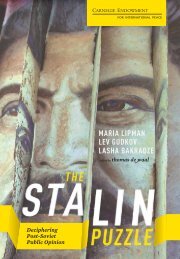getting to pluralism: political actors in the arab world - Carnegie ...
getting to pluralism: political actors in the arab world - Carnegie ...
getting to pluralism: political actors in the arab world - Carnegie ...
You also want an ePaper? Increase the reach of your titles
YUMPU automatically turns print PDFs into web optimized ePapers that Google loves.
Transcript Not Checked Aga<strong>in</strong>st Delivery<br />
And <strong>in</strong>terest<strong>in</strong>gly enough, <strong>the</strong> postponement decision was framed as a step <strong>to</strong>ward<br />
democracy. They said – <strong>the</strong> official rhe<strong>to</strong>ric was, we did not manage <strong>to</strong> <strong>in</strong>troduce enough<br />
democratic reforms <strong>to</strong> conduct free and fair national parliamentary elections. So we are wait<strong>in</strong>g <strong>to</strong><br />
<strong>in</strong>troduce <strong>the</strong> reforms and <strong>the</strong>refore, postpon<strong>in</strong>g <strong>the</strong> elections. So at least <strong>in</strong> terms of<br />
argumentation, Arab governments are becom<strong>in</strong>g <strong>to</strong> have a hard time postpon<strong>in</strong>g elections. So <strong>the</strong>re<br />
are some open<strong>in</strong>gs <strong>in</strong> conventional Arab <strong>political</strong> scenes, primarily related <strong>to</strong> elections.<br />
And <strong>the</strong> fact that we are look<strong>in</strong>g at pluralists, <strong>in</strong> spite of <strong>the</strong> fact that we have a lack of<br />
balance of power between governments and opposition movements – we are look<strong>in</strong>g at pluralist<br />
scenes <strong>in</strong> most Arab countries. There are some exceptions – Libya, Syria, Saudi Arabia. O<strong>the</strong>rwise,<br />
we are still look<strong>in</strong>g at pluralist Arab scenes.<br />
Now, let me move beyond sort of <strong>the</strong> major f<strong>in</strong>d<strong>in</strong>g of lack of <strong>political</strong> reform <strong>in</strong><strong>to</strong> what are<br />
<strong>the</strong> spaces of dynamism <strong>in</strong> Arab societies? And here, <strong>to</strong> be brief, <strong>the</strong>se spaces are primarily related<br />
<strong>to</strong> social unrest. You look at a place like Morocco or Algeria or Egypt, and only <strong>in</strong> <strong>the</strong> last 2 years,<br />
you see an unprecedented rise <strong>in</strong> labor sit-<strong>in</strong>s, <strong>in</strong> labor strikes, <strong>in</strong> bread-and-butter-motivated<br />
demonstrations and protest activities. In Egypt <strong>in</strong> 2006, we had over 700 protest activities. In<br />
Egypt of 2008, it moved beyond 1,000. And <strong>the</strong>se are unprecedented figures for Egypt s<strong>in</strong>ce 1952.<br />
And <strong>the</strong> same goes, however <strong>to</strong> a lesser extent, for a place like Morocco, for a place like<br />
Algeria, Jordan and o<strong>the</strong>r countries. What is happen<strong>in</strong>g here is Arab citizens who have become<br />
disenchanted with politics and conventional <strong>political</strong> ac<strong>to</strong>rs – government and opposition alike – are<br />
try<strong>in</strong>g <strong>to</strong> reorganize – <strong>to</strong> organize <strong>in</strong> a different way outside <strong>the</strong> sphere of conventional politics.<br />
Organization is tak<strong>in</strong>g place <strong>in</strong> <strong>the</strong> realm of civil society – but not civil society unders<strong>to</strong>od as<br />
human rights organizations and organizations defend<strong>in</strong>g women’s rights – of course, <strong>the</strong>y do exist;<br />
<strong>the</strong>y have been with us for a long time – but here, civil society organizations driven by<br />
socioeconomic platforms. Citizens are organiz<strong>in</strong>g <strong>in</strong> relation <strong>to</strong> salaries, wages, social security issues,<br />
health care. So <strong>in</strong> a way, we are look<strong>in</strong>g at spaces of dynamism outside <strong>the</strong> sphere of conventional<br />
politics, but spaces which are structured and organized around daily local and, <strong>in</strong> fact, <strong>political</strong> issues.<br />
Now, <strong>the</strong> second aspect of this new dynamism – and it’s on <strong>the</strong> rise, and of course, <strong>the</strong><br />
impact of economic and f<strong>in</strong>ancial crisis from which Arab governments are suffer<strong>in</strong>g, even Gulf<br />
countries are suffer<strong>in</strong>g, will push it <strong>to</strong> higher levels – <strong>the</strong> second aspect is that here, we are look<strong>in</strong>g at<br />
new organizational forms. We are no longer look<strong>in</strong>g at movements – religious-<strong>in</strong>spired ideological<br />
movements or liberal parties or leftist parties; we are look<strong>in</strong>g at new forms of organization.<br />
Much of what I am describ<strong>in</strong>g is related <strong>to</strong> Internet-based activism, Facebook activism.<br />
Much of what we have been see<strong>in</strong>g <strong>in</strong> Iran is happen<strong>in</strong>g <strong>in</strong> different Arab countries, but it’s yet <strong>to</strong><br />
reach <strong>the</strong> same levels which it reached <strong>in</strong> Iran right after <strong>the</strong> presidential election. So we are look<strong>in</strong>g<br />
at new forms – one, <strong>in</strong> terms of how <strong>the</strong>y organize and mobilize – as I said, no longer conventional<br />
<strong>political</strong> ac<strong>to</strong>rs, mass <strong>political</strong> parties or mass ideological movements; much more sec<strong>to</strong>r-oriented,<br />
related <strong>to</strong> very specific socioeconomic demands.<br />
It’s an urban phenomenon; <strong>the</strong>se new forms of dynamism are primarily urban-based.<br />
Certa<strong>in</strong>ly, <strong>the</strong>y are always related <strong>to</strong> – or let me put it <strong>in</strong> a different way – <strong>the</strong>y do not have a clear<br />
<strong>political</strong> platform, and <strong>the</strong>refore, <strong>the</strong>y can easily transcend <strong>the</strong> ideological barriers which dom<strong>in</strong>ated


